Unilever's Strategies: ICT, Talent Acquisition & Leadership Post-COVID
VerifiedAdded on 2023/06/11
|8
|2087
|433
Case Study
AI Summary
This case study delves into Unilever's post-pandemic management strategies, focusing on the impact of information and communication technology (ICT) on workforce management. It evaluates Unilever's existing policies related to talent acquisition, learning and development, and change management in the context of the COVID-19 competitive landscape. The report also discusses the role of leaders in implementing new initiatives, drawing on contemporary schools of leadership. Furthermore, it provides recommendations for new initiatives that Unilever should adopt to thrive in the new normal, emphasizing the importance of digital culture, employee training, and performance monitoring. The analysis highlights the dynamic nature of the business environment and the need for adaptation in the consumer goods industry.
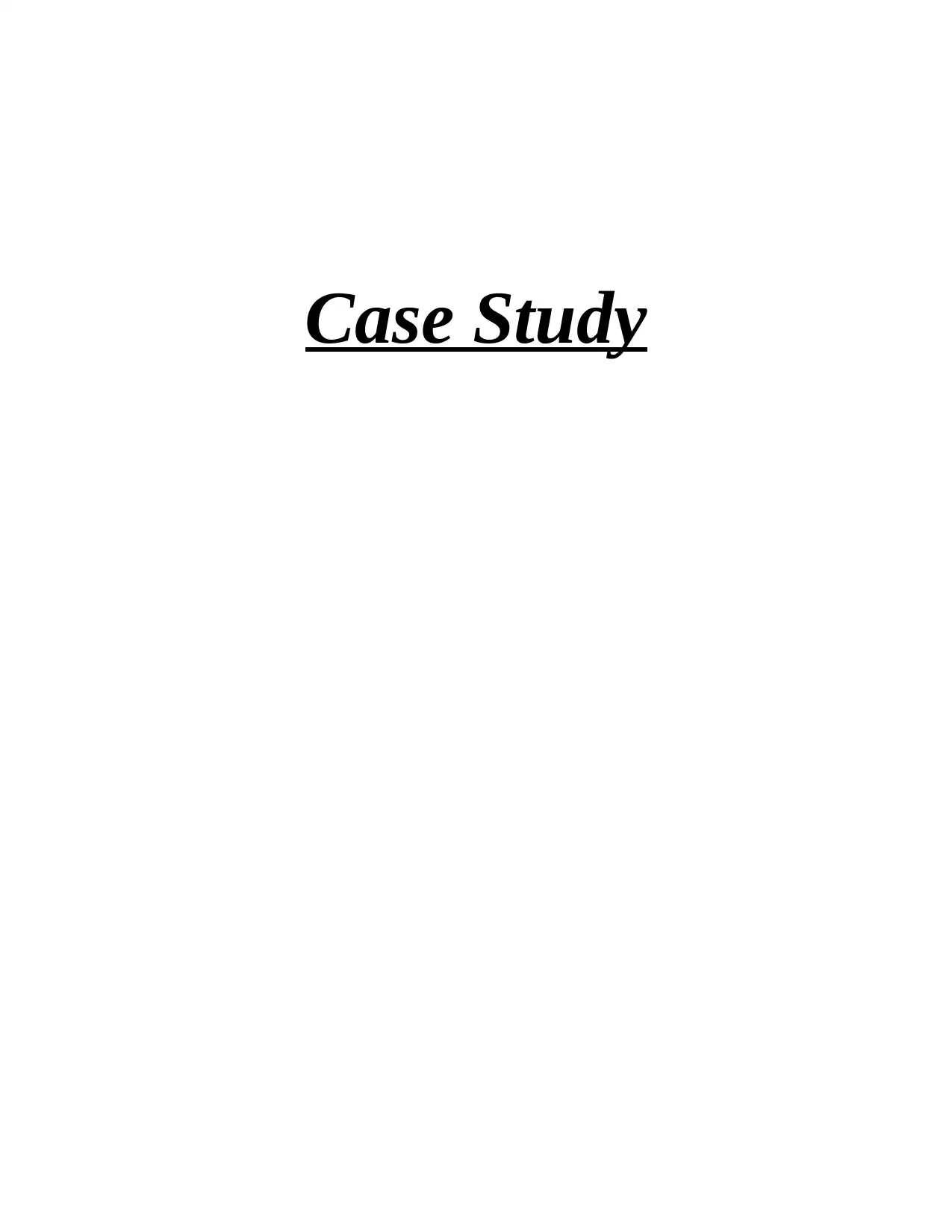
Case Study
Paraphrase This Document
Need a fresh take? Get an instant paraphrase of this document with our AI Paraphraser
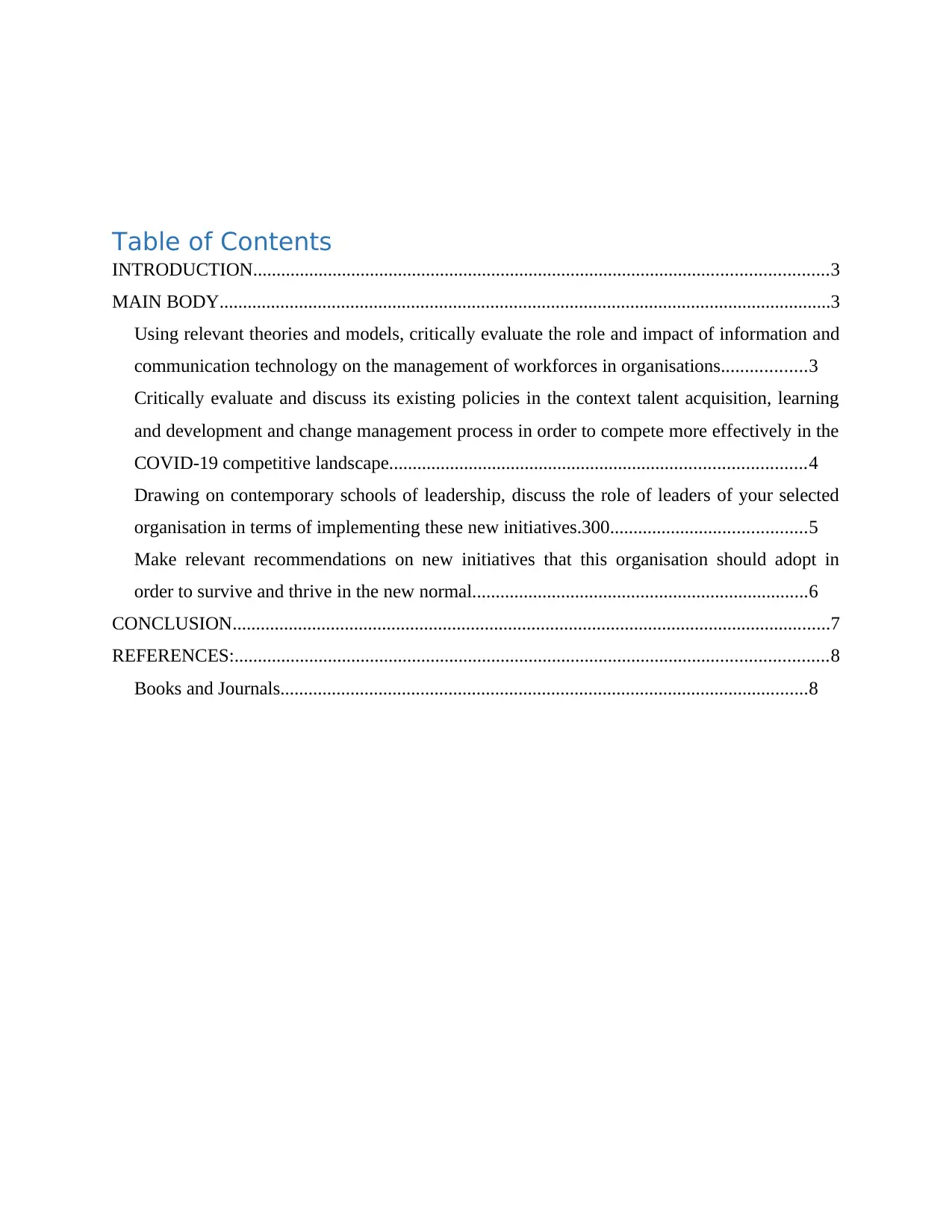
Table of Contents
INTRODUCTION...........................................................................................................................3
MAIN BODY...................................................................................................................................3
Using relevant theories and models, critically evaluate the role and impact of information and
communication technology on the management of workforces in organisations..................3
Critically evaluate and discuss its existing policies in the context talent acquisition, learning
and development and change management process in order to compete more effectively in the
COVID-19 competitive landscape.........................................................................................4
Drawing on contemporary schools of leadership, discuss the role of leaders of your selected
organisation in terms of implementing these new initiatives.300..........................................5
Make relevant recommendations on new initiatives that this organisation should adopt in
order to survive and thrive in the new normal........................................................................6
CONCLUSION................................................................................................................................7
REFERENCES:...............................................................................................................................8
Books and Journals.................................................................................................................8
INTRODUCTION...........................................................................................................................3
MAIN BODY...................................................................................................................................3
Using relevant theories and models, critically evaluate the role and impact of information and
communication technology on the management of workforces in organisations..................3
Critically evaluate and discuss its existing policies in the context talent acquisition, learning
and development and change management process in order to compete more effectively in the
COVID-19 competitive landscape.........................................................................................4
Drawing on contemporary schools of leadership, discuss the role of leaders of your selected
organisation in terms of implementing these new initiatives.300..........................................5
Make relevant recommendations on new initiatives that this organisation should adopt in
order to survive and thrive in the new normal........................................................................6
CONCLUSION................................................................................................................................7
REFERENCES:...............................................................................................................................8
Books and Journals.................................................................................................................8
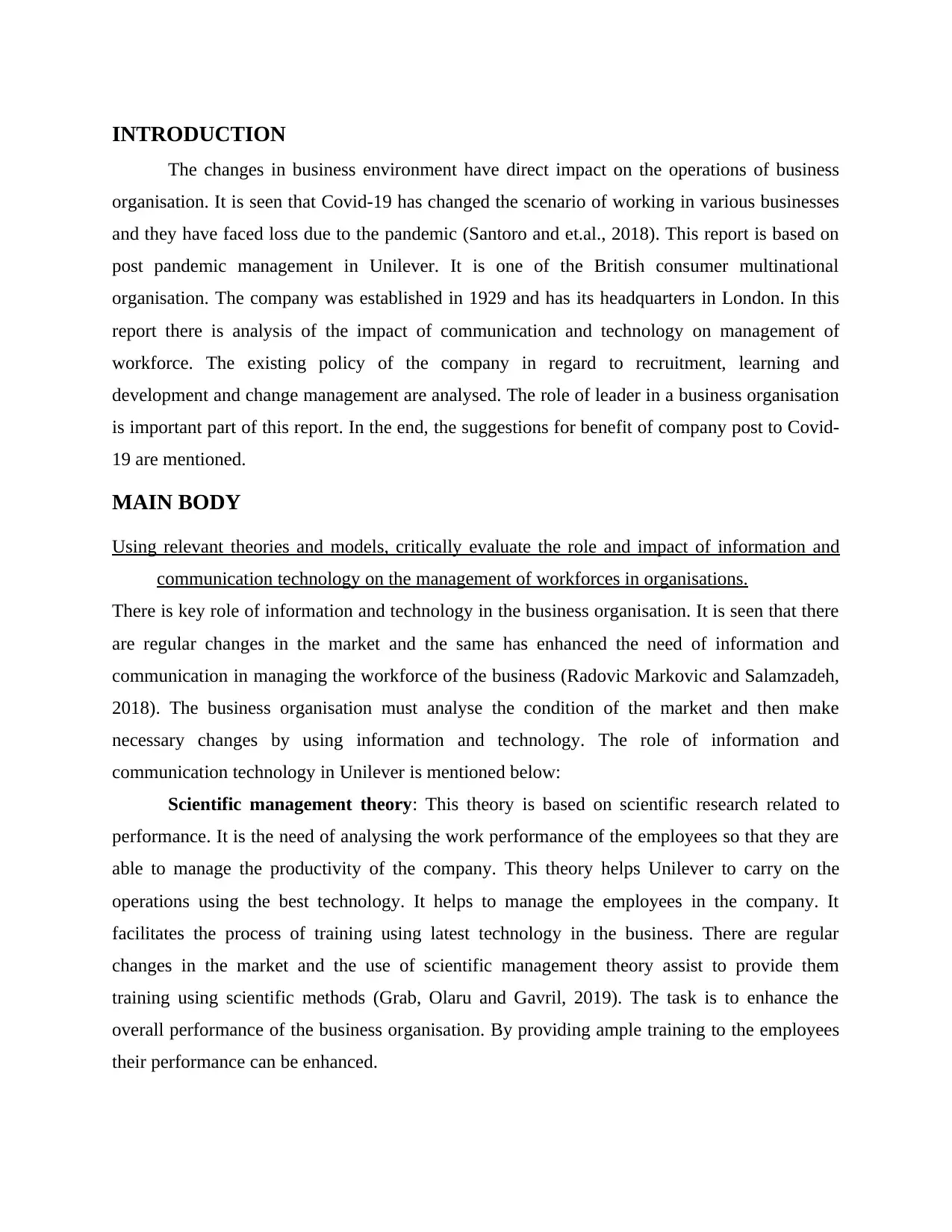
INTRODUCTION
The changes in business environment have direct impact on the operations of business
organisation. It is seen that Covid-19 has changed the scenario of working in various businesses
and they have faced loss due to the pandemic (Santoro and et.al., 2018). This report is based on
post pandemic management in Unilever. It is one of the British consumer multinational
organisation. The company was established in 1929 and has its headquarters in London. In this
report there is analysis of the impact of communication and technology on management of
workforce. The existing policy of the company in regard to recruitment, learning and
development and change management are analysed. The role of leader in a business organisation
is important part of this report. In the end, the suggestions for benefit of company post to Covid-
19 are mentioned.
MAIN BODY
Using relevant theories and models, critically evaluate the role and impact of information and
communication technology on the management of workforces in organisations.
There is key role of information and technology in the business organisation. It is seen that there
are regular changes in the market and the same has enhanced the need of information and
communication in managing the workforce of the business (Radovic Markovic and Salamzadeh,
2018). The business organisation must analyse the condition of the market and then make
necessary changes by using information and technology. The role of information and
communication technology in Unilever is mentioned below:
Scientific management theory: This theory is based on scientific research related to
performance. It is the need of analysing the work performance of the employees so that they are
able to manage the productivity of the company. This theory helps Unilever to carry on the
operations using the best technology. It helps to manage the employees in the company. It
facilitates the process of training using latest technology in the business. There are regular
changes in the market and the use of scientific management theory assist to provide them
training using scientific methods (Grab, Olaru and Gavril, 2019). The task is to enhance the
overall performance of the business organisation. By providing ample training to the employees
their performance can be enhanced.
The changes in business environment have direct impact on the operations of business
organisation. It is seen that Covid-19 has changed the scenario of working in various businesses
and they have faced loss due to the pandemic (Santoro and et.al., 2018). This report is based on
post pandemic management in Unilever. It is one of the British consumer multinational
organisation. The company was established in 1929 and has its headquarters in London. In this
report there is analysis of the impact of communication and technology on management of
workforce. The existing policy of the company in regard to recruitment, learning and
development and change management are analysed. The role of leader in a business organisation
is important part of this report. In the end, the suggestions for benefit of company post to Covid-
19 are mentioned.
MAIN BODY
Using relevant theories and models, critically evaluate the role and impact of information and
communication technology on the management of workforces in organisations.
There is key role of information and technology in the business organisation. It is seen that there
are regular changes in the market and the same has enhanced the need of information and
communication in managing the workforce of the business (Radovic Markovic and Salamzadeh,
2018). The business organisation must analyse the condition of the market and then make
necessary changes by using information and technology. The role of information and
communication technology in Unilever is mentioned below:
Scientific management theory: This theory is based on scientific research related to
performance. It is the need of analysing the work performance of the employees so that they are
able to manage the productivity of the company. This theory helps Unilever to carry on the
operations using the best technology. It helps to manage the employees in the company. It
facilitates the process of training using latest technology in the business. There are regular
changes in the market and the use of scientific management theory assist to provide them
training using scientific methods (Grab, Olaru and Gavril, 2019). The task is to enhance the
overall performance of the business organisation. By providing ample training to the employees
their performance can be enhanced.
⊘ This is a preview!⊘
Do you want full access?
Subscribe today to unlock all pages.

Trusted by 1+ million students worldwide
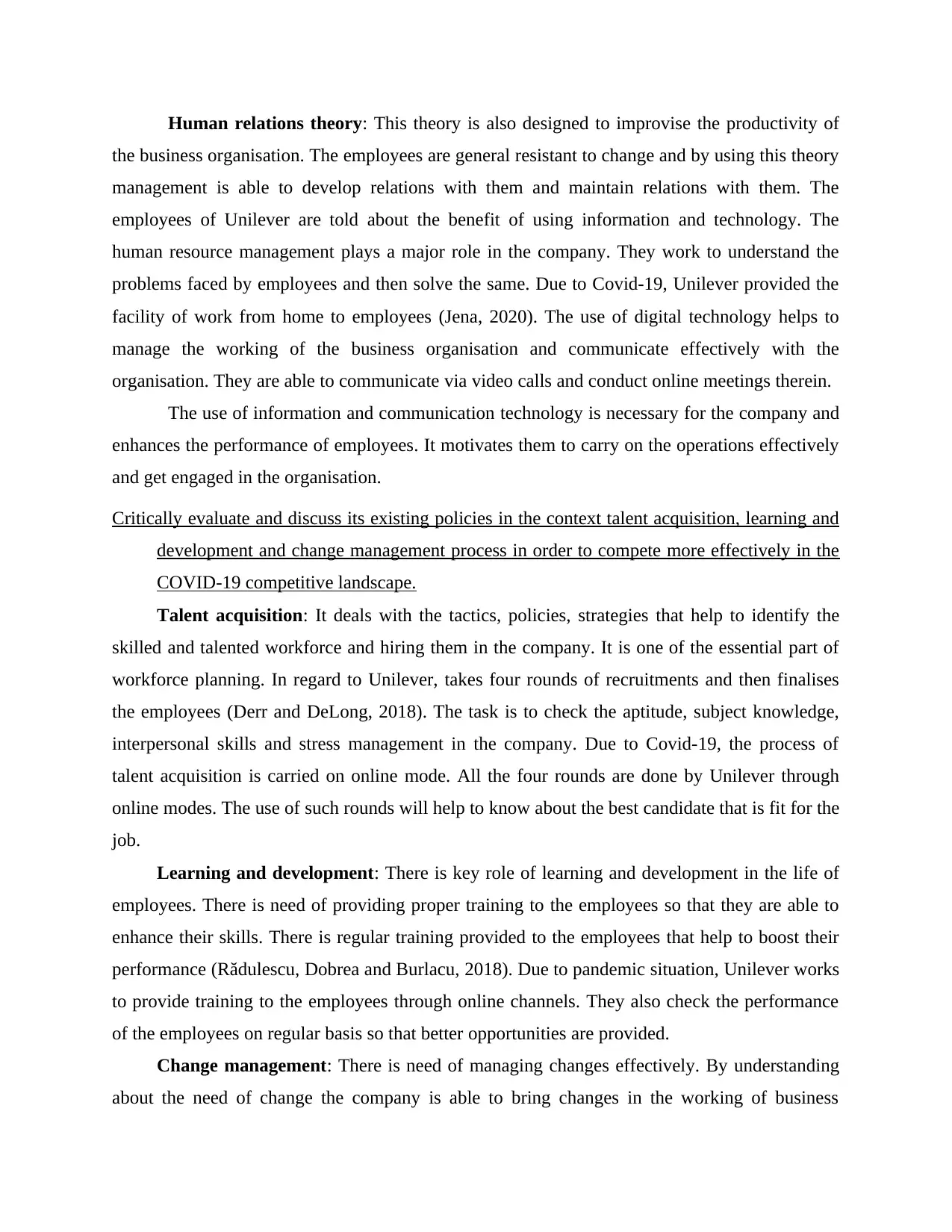
Human relations theory: This theory is also designed to improvise the productivity of
the business organisation. The employees are general resistant to change and by using this theory
management is able to develop relations with them and maintain relations with them. The
employees of Unilever are told about the benefit of using information and technology. The
human resource management plays a major role in the company. They work to understand the
problems faced by employees and then solve the same. Due to Covid-19, Unilever provided the
facility of work from home to employees (Jena, 2020). The use of digital technology helps to
manage the working of the business organisation and communicate effectively with the
organisation. They are able to communicate via video calls and conduct online meetings therein.
The use of information and communication technology is necessary for the company and
enhances the performance of employees. It motivates them to carry on the operations effectively
and get engaged in the organisation.
Critically evaluate and discuss its existing policies in the context talent acquisition, learning and
development and change management process in order to compete more effectively in the
COVID-19 competitive landscape.
Talent acquisition: It deals with the tactics, policies, strategies that help to identify the
skilled and talented workforce and hiring them in the company. It is one of the essential part of
workforce planning. In regard to Unilever, takes four rounds of recruitments and then finalises
the employees (Derr and DeLong, 2018). The task is to check the aptitude, subject knowledge,
interpersonal skills and stress management in the company. Due to Covid-19, the process of
talent acquisition is carried on online mode. All the four rounds are done by Unilever through
online modes. The use of such rounds will help to know about the best candidate that is fit for the
job.
Learning and development: There is key role of learning and development in the life of
employees. There is need of providing proper training to the employees so that they are able to
enhance their skills. There is regular training provided to the employees that help to boost their
performance (Rădulescu, Dobrea and Burlacu, 2018). Due to pandemic situation, Unilever works
to provide training to the employees through online channels. They also check the performance
of the employees on regular basis so that better opportunities are provided.
Change management: There is need of managing changes effectively. By understanding
about the need of change the company is able to bring changes in the working of business
the business organisation. The employees are general resistant to change and by using this theory
management is able to develop relations with them and maintain relations with them. The
employees of Unilever are told about the benefit of using information and technology. The
human resource management plays a major role in the company. They work to understand the
problems faced by employees and then solve the same. Due to Covid-19, Unilever provided the
facility of work from home to employees (Jena, 2020). The use of digital technology helps to
manage the working of the business organisation and communicate effectively with the
organisation. They are able to communicate via video calls and conduct online meetings therein.
The use of information and communication technology is necessary for the company and
enhances the performance of employees. It motivates them to carry on the operations effectively
and get engaged in the organisation.
Critically evaluate and discuss its existing policies in the context talent acquisition, learning and
development and change management process in order to compete more effectively in the
COVID-19 competitive landscape.
Talent acquisition: It deals with the tactics, policies, strategies that help to identify the
skilled and talented workforce and hiring them in the company. It is one of the essential part of
workforce planning. In regard to Unilever, takes four rounds of recruitments and then finalises
the employees (Derr and DeLong, 2018). The task is to check the aptitude, subject knowledge,
interpersonal skills and stress management in the company. Due to Covid-19, the process of
talent acquisition is carried on online mode. All the four rounds are done by Unilever through
online modes. The use of such rounds will help to know about the best candidate that is fit for the
job.
Learning and development: There is key role of learning and development in the life of
employees. There is need of providing proper training to the employees so that they are able to
enhance their skills. There is regular training provided to the employees that help to boost their
performance (Rădulescu, Dobrea and Burlacu, 2018). Due to pandemic situation, Unilever works
to provide training to the employees through online channels. They also check the performance
of the employees on regular basis so that better opportunities are provided.
Change management: There is need of managing changes effectively. By understanding
about the need of change the company is able to bring changes in the working of business
Paraphrase This Document
Need a fresh take? Get an instant paraphrase of this document with our AI Paraphraser
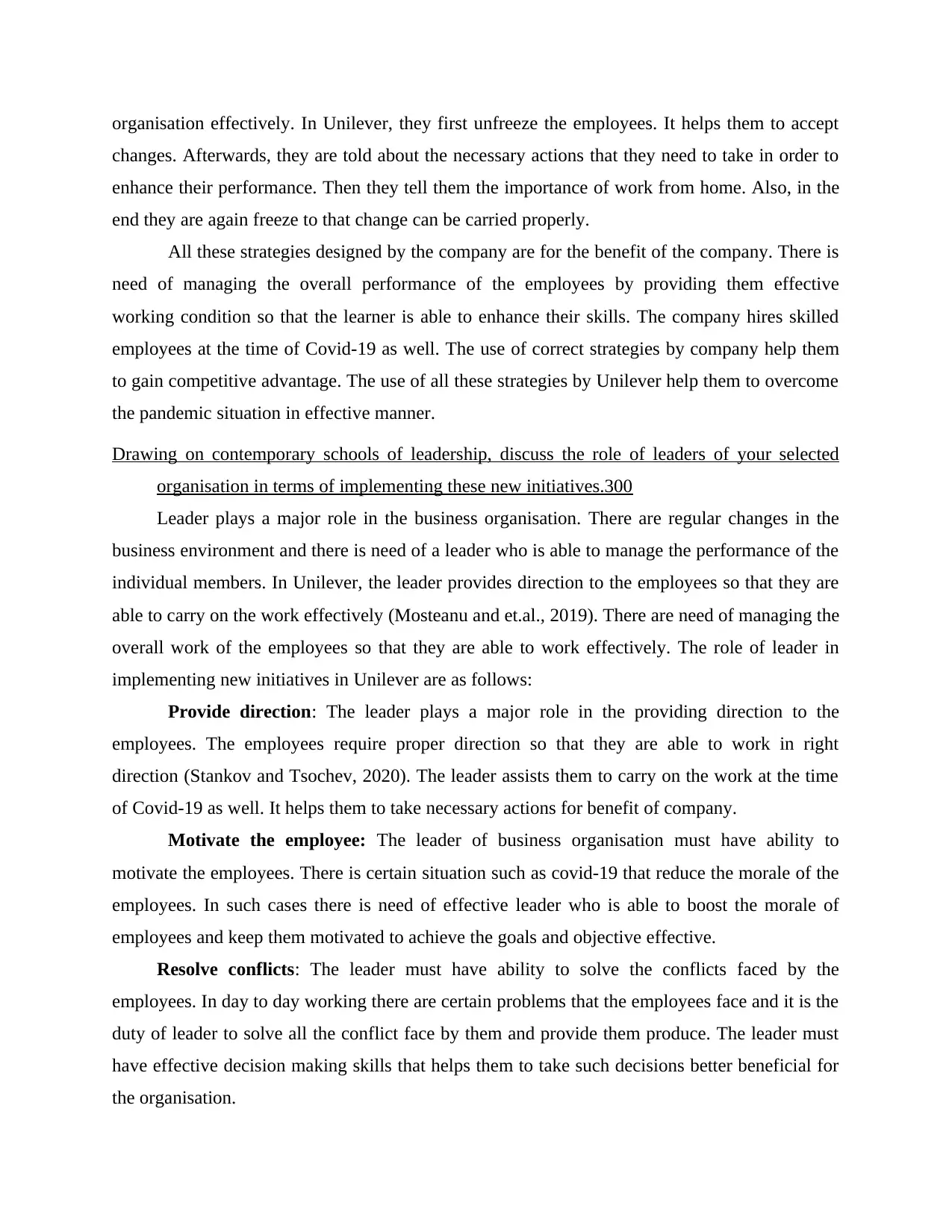
organisation effectively. In Unilever, they first unfreeze the employees. It helps them to accept
changes. Afterwards, they are told about the necessary actions that they need to take in order to
enhance their performance. Then they tell them the importance of work from home. Also, in the
end they are again freeze to that change can be carried properly.
All these strategies designed by the company are for the benefit of the company. There is
need of managing the overall performance of the employees by providing them effective
working condition so that the learner is able to enhance their skills. The company hires skilled
employees at the time of Covid-19 as well. The use of correct strategies by company help them
to gain competitive advantage. The use of all these strategies by Unilever help them to overcome
the pandemic situation in effective manner.
Drawing on contemporary schools of leadership, discuss the role of leaders of your selected
organisation in terms of implementing these new initiatives.300
Leader plays a major role in the business organisation. There are regular changes in the
business environment and there is need of a leader who is able to manage the performance of the
individual members. In Unilever, the leader provides direction to the employees so that they are
able to carry on the work effectively (Mosteanu and et.al., 2019). There are need of managing the
overall work of the employees so that they are able to work effectively. The role of leader in
implementing new initiatives in Unilever are as follows:
Provide direction: The leader plays a major role in the providing direction to the
employees. The employees require proper direction so that they are able to work in right
direction (Stankov and Tsochev, 2020). The leader assists them to carry on the work at the time
of Covid-19 as well. It helps them to take necessary actions for benefit of company.
Motivate the employee: The leader of business organisation must have ability to
motivate the employees. There is certain situation such as covid-19 that reduce the morale of the
employees. In such cases there is need of effective leader who is able to boost the morale of
employees and keep them motivated to achieve the goals and objective effective.
Resolve conflicts: The leader must have ability to solve the conflicts faced by the
employees. In day to day working there are certain problems that the employees face and it is the
duty of leader to solve all the conflict face by them and provide them produce. The leader must
have effective decision making skills that helps them to take such decisions better beneficial for
the organisation.
changes. Afterwards, they are told about the necessary actions that they need to take in order to
enhance their performance. Then they tell them the importance of work from home. Also, in the
end they are again freeze to that change can be carried properly.
All these strategies designed by the company are for the benefit of the company. There is
need of managing the overall performance of the employees by providing them effective
working condition so that the learner is able to enhance their skills. The company hires skilled
employees at the time of Covid-19 as well. The use of correct strategies by company help them
to gain competitive advantage. The use of all these strategies by Unilever help them to overcome
the pandemic situation in effective manner.
Drawing on contemporary schools of leadership, discuss the role of leaders of your selected
organisation in terms of implementing these new initiatives.300
Leader plays a major role in the business organisation. There are regular changes in the
business environment and there is need of a leader who is able to manage the performance of the
individual members. In Unilever, the leader provides direction to the employees so that they are
able to carry on the work effectively (Mosteanu and et.al., 2019). There are need of managing the
overall work of the employees so that they are able to work effectively. The role of leader in
implementing new initiatives in Unilever are as follows:
Provide direction: The leader plays a major role in the providing direction to the
employees. The employees require proper direction so that they are able to work in right
direction (Stankov and Tsochev, 2020). The leader assists them to carry on the work at the time
of Covid-19 as well. It helps them to take necessary actions for benefit of company.
Motivate the employee: The leader of business organisation must have ability to
motivate the employees. There is certain situation such as covid-19 that reduce the morale of the
employees. In such cases there is need of effective leader who is able to boost the morale of
employees and keep them motivated to achieve the goals and objective effective.
Resolve conflicts: The leader must have ability to solve the conflicts faced by the
employees. In day to day working there are certain problems that the employees face and it is the
duty of leader to solve all the conflict face by them and provide them produce. The leader must
have effective decision making skills that helps them to take such decisions better beneficial for
the organisation.
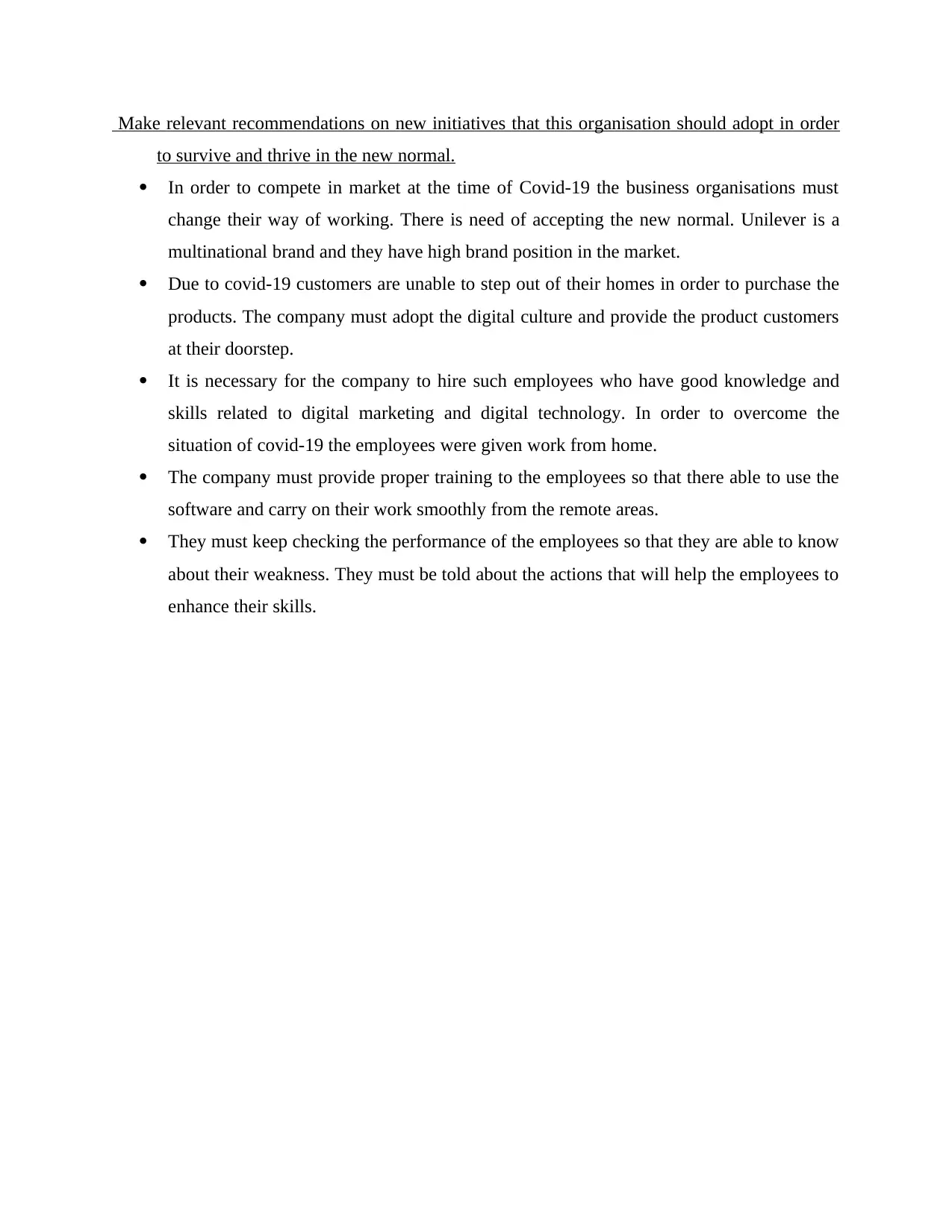
Make relevant recommendations on new initiatives that this organisation should adopt in order
to survive and thrive in the new normal.
In order to compete in market at the time of Covid-19 the business organisations must
change their way of working. There is need of accepting the new normal. Unilever is a
multinational brand and they have high brand position in the market.
Due to covid-19 customers are unable to step out of their homes in order to purchase the
products. The company must adopt the digital culture and provide the product customers
at their doorstep.
It is necessary for the company to hire such employees who have good knowledge and
skills related to digital marketing and digital technology. In order to overcome the
situation of covid-19 the employees were given work from home.
The company must provide proper training to the employees so that there able to use the
software and carry on their work smoothly from the remote areas.
They must keep checking the performance of the employees so that they are able to know
about their weakness. They must be told about the actions that will help the employees to
enhance their skills.
to survive and thrive in the new normal.
In order to compete in market at the time of Covid-19 the business organisations must
change their way of working. There is need of accepting the new normal. Unilever is a
multinational brand and they have high brand position in the market.
Due to covid-19 customers are unable to step out of their homes in order to purchase the
products. The company must adopt the digital culture and provide the product customers
at their doorstep.
It is necessary for the company to hire such employees who have good knowledge and
skills related to digital marketing and digital technology. In order to overcome the
situation of covid-19 the employees were given work from home.
The company must provide proper training to the employees so that there able to use the
software and carry on their work smoothly from the remote areas.
They must keep checking the performance of the employees so that they are able to know
about their weakness. They must be told about the actions that will help the employees to
enhance their skills.
⊘ This is a preview!⊘
Do you want full access?
Subscribe today to unlock all pages.

Trusted by 1+ million students worldwide
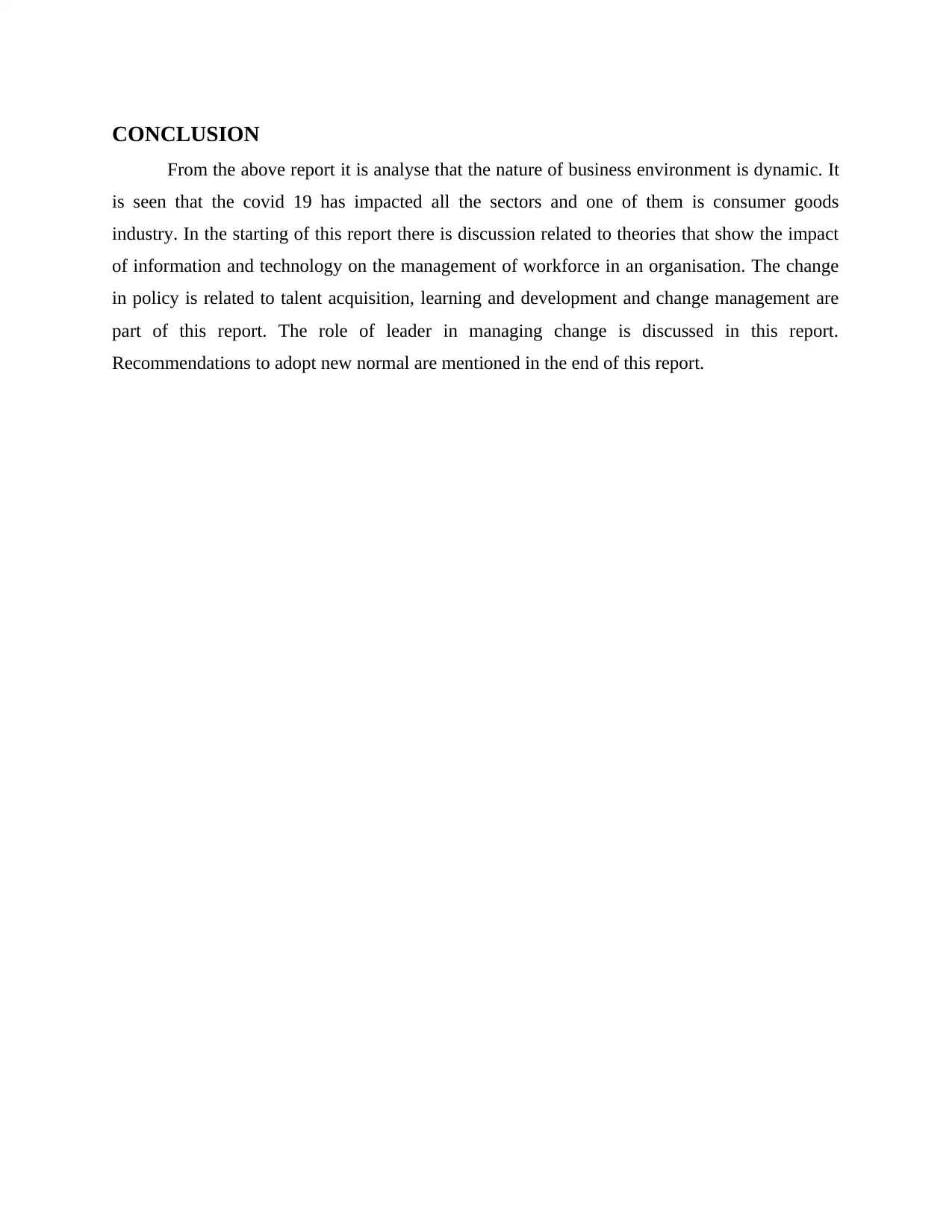
CONCLUSION
From the above report it is analyse that the nature of business environment is dynamic. It
is seen that the covid 19 has impacted all the sectors and one of them is consumer goods
industry. In the starting of this report there is discussion related to theories that show the impact
of information and technology on the management of workforce in an organisation. The change
in policy is related to talent acquisition, learning and development and change management are
part of this report. The role of leader in managing change is discussed in this report.
Recommendations to adopt new normal are mentioned in the end of this report.
From the above report it is analyse that the nature of business environment is dynamic. It
is seen that the covid 19 has impacted all the sectors and one of them is consumer goods
industry. In the starting of this report there is discussion related to theories that show the impact
of information and technology on the management of workforce in an organisation. The change
in policy is related to talent acquisition, learning and development and change management are
part of this report. The role of leader in managing change is discussed in this report.
Recommendations to adopt new normal are mentioned in the end of this report.
Paraphrase This Document
Need a fresh take? Get an instant paraphrase of this document with our AI Paraphraser
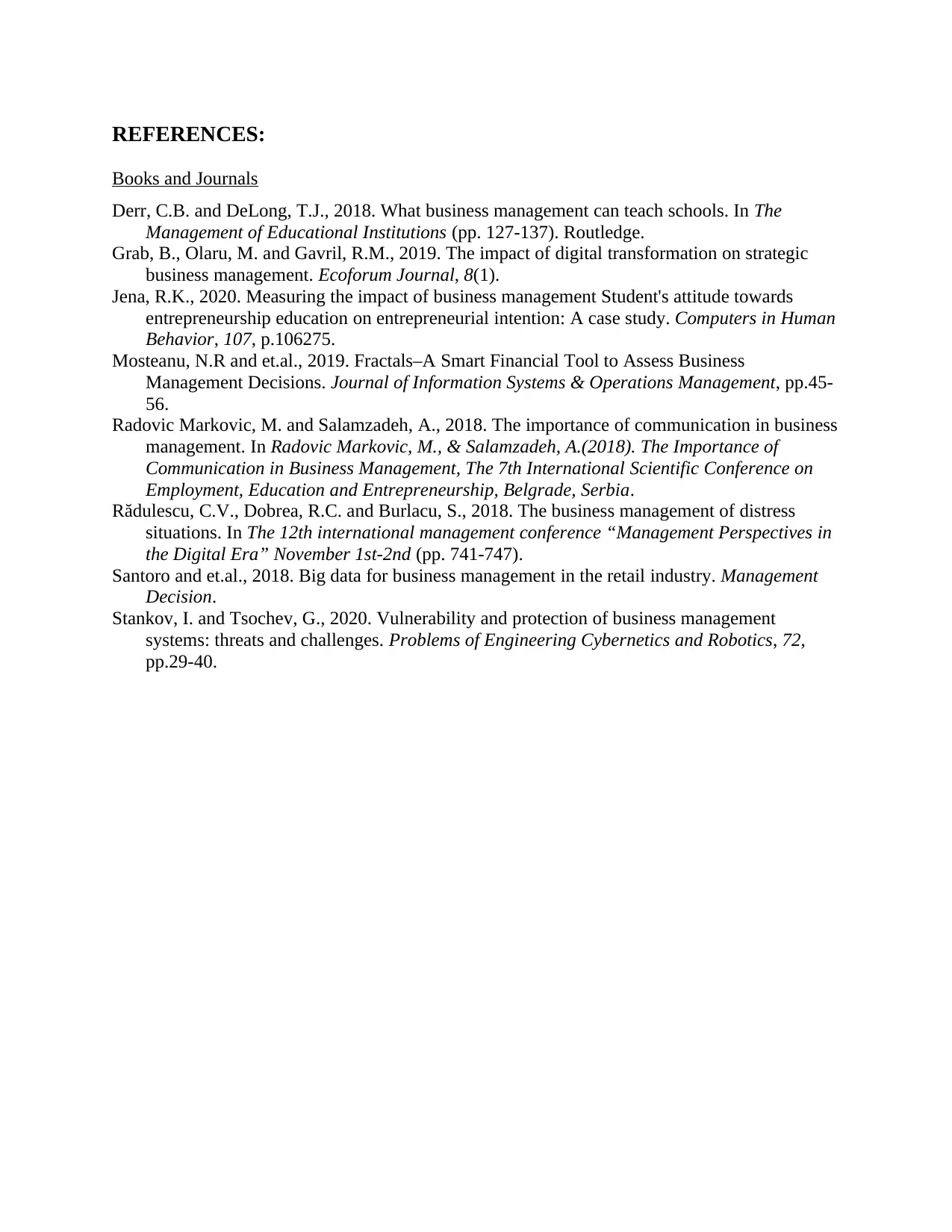
REFERENCES:
Books and Journals
Derr, C.B. and DeLong, T.J., 2018. What business management can teach schools. In The
Management of Educational Institutions (pp. 127-137). Routledge.
Grab, B., Olaru, M. and Gavril, R.M., 2019. The impact of digital transformation on strategic
business management. Ecoforum Journal, 8(1).
Jena, R.K., 2020. Measuring the impact of business management Student's attitude towards
entrepreneurship education on entrepreneurial intention: A case study. Computers in Human
Behavior, 107, p.106275.
Mosteanu, N.R and et.al., 2019. Fractals–A Smart Financial Tool to Assess Business
Management Decisions. Journal of Information Systems & Operations Management, pp.45-
56.
Radovic Markovic, M. and Salamzadeh, A., 2018. The importance of communication in business
management. In Radovic Markovic, M., & Salamzadeh, A.(2018). The Importance of
Communication in Business Management, The 7th International Scientific Conference on
Employment, Education and Entrepreneurship, Belgrade, Serbia.
Rădulescu, C.V., Dobrea, R.C. and Burlacu, S., 2018. The business management of distress
situations. In The 12th international management conference “Management Perspectives in
the Digital Era” November 1st-2nd (pp. 741-747).
Santoro and et.al., 2018. Big data for business management in the retail industry. Management
Decision.
Stankov, I. and Tsochev, G., 2020. Vulnerability and protection of business management
systems: threats and challenges. Problems of Engineering Cybernetics and Robotics, 72,
pp.29-40.
Books and Journals
Derr, C.B. and DeLong, T.J., 2018. What business management can teach schools. In The
Management of Educational Institutions (pp. 127-137). Routledge.
Grab, B., Olaru, M. and Gavril, R.M., 2019. The impact of digital transformation on strategic
business management. Ecoforum Journal, 8(1).
Jena, R.K., 2020. Measuring the impact of business management Student's attitude towards
entrepreneurship education on entrepreneurial intention: A case study. Computers in Human
Behavior, 107, p.106275.
Mosteanu, N.R and et.al., 2019. Fractals–A Smart Financial Tool to Assess Business
Management Decisions. Journal of Information Systems & Operations Management, pp.45-
56.
Radovic Markovic, M. and Salamzadeh, A., 2018. The importance of communication in business
management. In Radovic Markovic, M., & Salamzadeh, A.(2018). The Importance of
Communication in Business Management, The 7th International Scientific Conference on
Employment, Education and Entrepreneurship, Belgrade, Serbia.
Rădulescu, C.V., Dobrea, R.C. and Burlacu, S., 2018. The business management of distress
situations. In The 12th international management conference “Management Perspectives in
the Digital Era” November 1st-2nd (pp. 741-747).
Santoro and et.al., 2018. Big data for business management in the retail industry. Management
Decision.
Stankov, I. and Tsochev, G., 2020. Vulnerability and protection of business management
systems: threats and challenges. Problems of Engineering Cybernetics and Robotics, 72,
pp.29-40.
1 out of 8
Related Documents
Your All-in-One AI-Powered Toolkit for Academic Success.
+13062052269
info@desklib.com
Available 24*7 on WhatsApp / Email
![[object Object]](/_next/static/media/star-bottom.7253800d.svg)
Unlock your academic potential
Copyright © 2020–2026 A2Z Services. All Rights Reserved. Developed and managed by ZUCOL.

